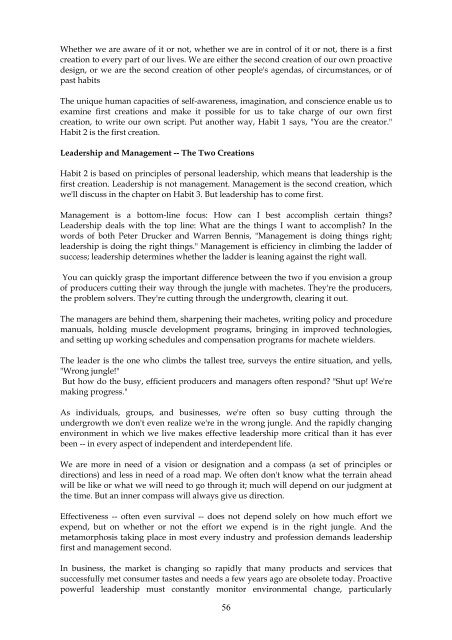Covey - The 7 habits of highly effective people
Create successful ePaper yourself
Turn your PDF publications into a flip-book with our unique Google optimized e-Paper software.
Whether we are aware <strong>of</strong> it or not, whether we are in control <strong>of</strong> it or not, there is a first<br />
creation to every part <strong>of</strong> our lives. We are either the second creation <strong>of</strong> our own proactive<br />
design, or we are the second creation <strong>of</strong> other <strong>people</strong>'s agendas, <strong>of</strong> circumstances, or <strong>of</strong><br />
past <strong>habits</strong><br />
<strong>The</strong> unique human capacities <strong>of</strong> self-awareness, imagination, and conscience enable us to<br />
examine first creations and make it possible for us to take charge <strong>of</strong> our own first<br />
creation, to write our own script. Put another way, Habit 1 says, "You are the creator."<br />
Habit 2 is the first creation.<br />
Leadership and Management -- <strong>The</strong> Two Creations<br />
Habit 2 is based on principles <strong>of</strong> personal leadership, which means that leadership is the<br />
first creation. Leadership is not management. Management is the second creation, which<br />
we'll discuss in the chapter on Habit 3. But leadership has to come first.<br />
Management is a bottom-line focus: How can I best accomplish certain things?<br />
Leadership deals with the top line: What are the things I want to accomplish? In the<br />
words <strong>of</strong> both Peter Drucker and Warren Bennis, "Management is doing things right;<br />
leadership is doing the right things." Management is efficiency in climbing the ladder <strong>of</strong><br />
success; leadership determines whether the ladder is leaning against the right wall.<br />
You can quickly grasp the important difference between the two if you envision a group<br />
<strong>of</strong> producers cutting their way through the jungle with machetes. <strong>The</strong>y're the producers,<br />
the problem solvers. <strong>The</strong>y're cutting through the undergrowth, clearing it out.<br />
<strong>The</strong> managers are behind them, sharpening their machetes, writing policy and procedure<br />
manuals, holding muscle development programs, bringing in improved technologies,<br />
and setting up working schedules and compensation programs for machete wielders.<br />
<strong>The</strong> leader is the one who climbs the tallest tree, surveys the entire situation, and yells,<br />
"Wrong jungle!"<br />
But how do the busy, efficient producers and managers <strong>of</strong>ten respond? "Shut up! We're<br />
making progress."<br />
As individuals, groups, and businesses, we're <strong>of</strong>ten so busy cutting through the<br />
undergrowth we don't even realize we're in the wrong jungle. And the rapidly changing<br />
environment in which we live makes <strong>effective</strong> leadership more critical than it has ever<br />
been -- in every aspect <strong>of</strong> independent and interdependent life.<br />
We are more in need <strong>of</strong> a vision or designation and a compass (a set <strong>of</strong> principles or<br />
directions) and less in need <strong>of</strong> a road map. We <strong>of</strong>ten don't know what the terrain ahead<br />
will be like or what we will need to go through it; much will depend on our judgment at<br />
the time. But an inner compass will always give us direction.<br />
Effectiveness -- <strong>of</strong>ten even survival -- does not depend solely on how much effort we<br />
expend, but on whether or not the effort we expend is in the right jungle. And the<br />
metamorphosis taking place in most every industry and pr<strong>of</strong>ession demands leadership<br />
first and management second.<br />
In business, the market is changing so rapidly that many products and services that<br />
successfully met consumer tastes and needs a few years ago are obsolete today. Proactive<br />
powerful leadership must constantly monitor environmental change, particularly<br />
56


